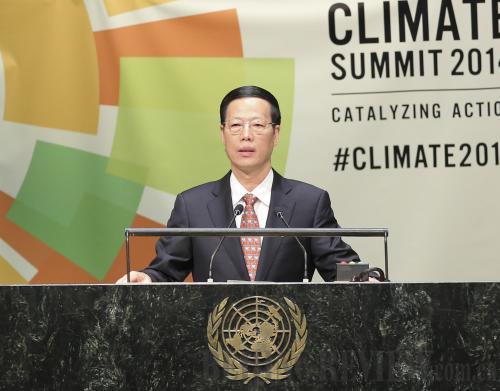|
 |
|
MAKING A PLEDGE: Chinese Vice Premier Zhang Gaoli delivers a speech at the UN Climate Summit in New York City on September 23 (DING LIN) |
Climate change is happening, and every country must do their part to address the global issue. This sentiment received a consensus amongst all leaders and representatives attending the 2014 UN Climate Summit in New York City on September 23.
Convened by UN Secretary General Ban Ki-moon, the one-day summit, themed "Catalyzing Action," set the stage for a crucial conference in Paris in December 2015 aimed at finalizing a new global climate change pact for post-2020.
During the meeting, delegates from over 200 countries and international organizations, including more than 120 heads of state or government, announced their commitment and plans to reduce emissions and enhance financing and technological cooperation for climate change.
However, the grim reality of global warming has shown that hollow slogans and proposals cannot save the world. Every country must take practical measures immediately.
On September 9, the World Meteorological Organization said in the 2014 Greenhouse Gas Bulletin that the amount of greenhouse gases in the atmosphere reached a new high in the last year, continuing an upward and accelerating trend that is driving climate change and will shape the future of our planet for hundreds or even thousands of years. The annual report is based on global observations through 2013.
Gailius Draugelis, World Bank lead energy specialist for China and Mongolia, told Beijing Review that among the three major factors contributing to the increase in greenhouse gases, the primary one is a soaring energy demand, driven by aspirations around the world for a better quality of life. Despite the world's tremendous efforts to reduce energy consumption and increase energy efficiency, the demand is still growing.
The second factor is the combustion of fossil fuels, especially the increased use of coal, which has high carbon content, Draugelis said. He added that in some regions, coal accounts for a big part of energy consumption due to its abundant supply, relatively low prices and the market's failure to take into account the negative social and environmental consequences.
And finally, Draugelis noted that the capacity of carbon sink, particularly the ocean's ability to absorb excess carbon dioxide from the atmosphere, seems to have come to a point of increasing saturation. "So, clearly, as the capacity of carbon sink decreases, the efforts to reduce emissions growth must accelerate if we are to avoid the predicted global climate change," he said.
China's contribution
China, as the largest emerging economy in the world, has been increasingly aware of the importance of cutting emissions to fight against climate change together with other countries. Chinese President Xi Jinping pointed out that the nation must respond to climate change in order to achieve sustainable development at home and to fulfill its international obligations as a responsible major country.
As Xi's special envoy, Vice Premier Zhang Gaoli delivered a speech at the UN Climate Summit. Zhang said that China will announce post-2020 actions on climate change as soon as possible, including measures to reduce carbon intensity and bring about the peak of the country's total carbon dioxide emissions.
Zhang said that China was the first developing country to formulate and implement a national program for climate change. Prior to the UN Climate Summit, the National Action Plan for Climate Change (2014-20) was approved by the State Council, China's cabinet, on September 19. In the document, the Chinese Government commits to cutting carbon intensity, namely emissions per 10,000 yuan ($1,630) of GDP, by 40-45 percent by 2020 from the 2005 level.
| 